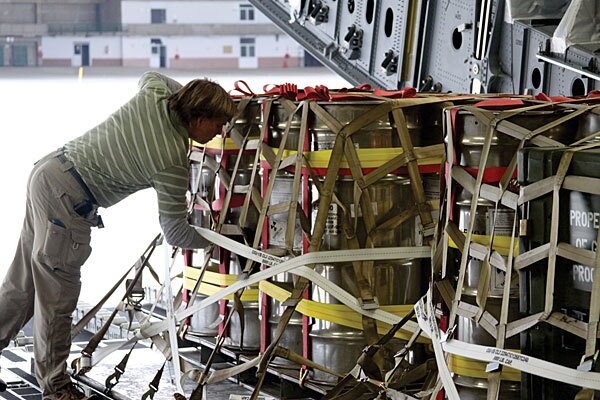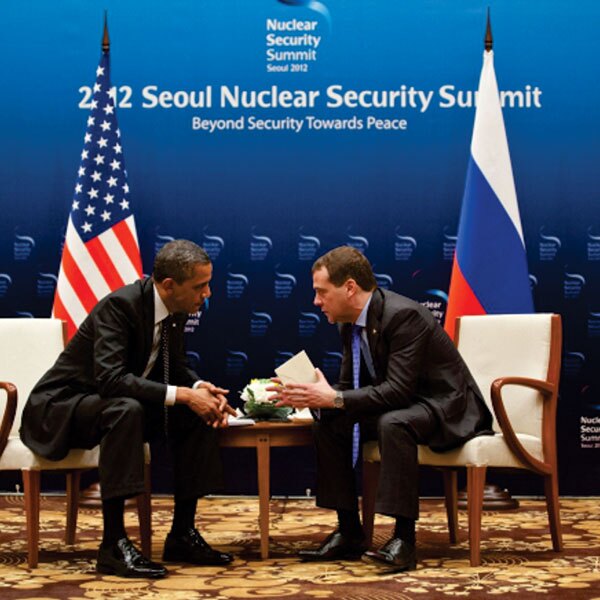Obama urges renewed efforts on arms control
DOI: 10.1063/PT.3.1552
Gathering with more than 50 other heads of state in Seoul, South Korea, in late March, President Obama pledged to negotiate further reductions to the US and Russian nuclear arsenals and trumpeted the progress made toward securing the world’s vulnerable stocks of highly enriched uranium (HEU) and plutonium since the inaugural 2010 Nuclear Security Summit in Washington, DC.
“I firmly believe that we can ensure the security of the United States and our allies, maintain a strong deterrent against any threat, and still pursue further reductions in our nuclear arsenal,” Obama said in a speech at Seoul’s Hankuk University of Foreign Studies. “Going forward, we’ll continue to seek discussions with Russia on a step we have never taken before—reducing not only our strategic nuclear warheads, but also tactical weapons and warheads in reserve.” The New START treaty, which went into force last year, requires each of the two nuclear superpowers to reduce its strategic stockpile to 1550 deployed weapons and 5000 warheads by 2018.
Obama touted progress made toward the goal he set at the 2010 summit: to secure all civilian inventories of HEU and plutonium by 2014. “South Korea, Japan, Pakistan, and others are building new centers to improve nuclear security and training,” Obama said. “Nations like Kazakhstan have moved nuclear materials to more secure locations.” Mexico and Ukraine just recently removed all the HEU from their territory, he said, noting that “all told, thousands of pounds of nuclear material have been removed from vulnerable sites around the world.”
Nuclear quid pro quo
Among a slew of moves announced in March by the White House and the Department of Energy’s National Nuclear Security Administration were the removal of more than 3 kg of plutonium from Sweden—a process that was four years in the making—and the shipment to Russia of 128 kg of HEU from Ukraine, with assistance from the US. In addition, Belgium, the Netherlands, and France agreed to convert their reactors that produce the medical isotope molybdenum-99 to use low-enriched uranium by 2015 in exchange for a commitment from the US to continue supplying them with HEU until then. The European nations also agreed to “deal in a responsible manner with existing large amounts of scrap HEU resulting from past activities by recycling or disposing them, with the support of the United States and other partners,” according to a statement issued jointly by the parties. And the US, Mexico, and Canada announced the removal of an unspecified quantity of HEU from a Mexican research reactor in exchange for a US supply of low-enriched material.
Obama pledged to seek Senate ratification of the Comprehensive Nuclear-Test-Ban Treaty and to propose further nuclear arms cuts when he meets with Russian president-elect Vladimir Putin this month. Obama also invited China to begin a dialog with the US on nuclear arms limits.
But despite the progress made in securing weapons materials, Obama acknowledged the continuing threat of nuclear terrorism. “We know that nuclear material, enough for many weapons, is still being stored without adequate protection. And we know that terrorists and criminal gangs are still trying to get their hands on it—as well as radioactive material for a dirty bomb. We know that just the smallest amount of plutonium—about the size of an apple—could kill hundreds of thousands and spark a global crisis,” the president told the Seoul audience.
Diminished role for nukes
The US, Obama vowed, will not develop new nuclear warheads or pursue new military missions for nuclear weapons. “We’ve narrowed the range of contingencies under which we would ever use or threaten to use nuclear weapons,” he said. “My administration’s nuclear posture recognizes that the massive nuclear arsenal we inherited from the cold war is poorly suited to today’s threats, including nuclear terrorism.” A comprehensive study of US nuclear forces Obama ordered last summer is still under way, he said. “But even as we have more work to do, we can already say with confidence that we have more nuclear weapons than we need.”
According to a new report from Harvard University’s Belfer Center for Science and International Affairs, the threat of nuclear terrorism continues to grow in Pakistan in tandem with that country’s growing nuclear arsenal and increasingly capable adversaries. The report also noted that 120 research reactors worldwide continue to use HEU. It said that nations with nuclear materials should build up their defenses sufficiently to repel an attack from well-trained and well-armed terrorists and should drastically lower the number of locations where the materials are kept.
Former Senator Sam Nunn, cochair of the Nuclear Threat Initiative, said governments still need to establish best practices for security and benchmark their progress. Greater transparency by governments that possess the materials, he said, is needed in order to build international confidence.
Joseph Cirincione, president of the Ploughshares Fund, calls the summit “underperforming” and says it “didn’t demand attention and didn’t reach for new goals.” He says that plutonium received little attention at the gathering because South Korea has indicated it wants to use mixed oxide fuel—which contains plutonium—in its nuclear reactors.
Cirincione also criticizes the Obama administration for its silence concerning summit remarks by South African president Jacob Zuma that his country may resume producing HEU. In 2010 the South African Nuclear Energy Corp became the first of the world’s major producers of the medical isotope molybdenum-99 to ship a commercial quantity of the material made without HEU (see PHYSICS TODAY,February 2011, page 17

A technician inspects containers of highly enriched uranium aboard a US Air Force cargo plane during an operation to transport the material from a Mexican research reactor to storage at Oak Ridge, Tennessee.
NATIONAL NUCLEAR SECURITY ADMINISTRATION


President Obama and Russian president Dmitry Medvedev confer during the nuclear security summit in Seoul.
PETE SOUZA, WHITE HOUSE

More about the authors
David Kramer, dkramer@aip.org




